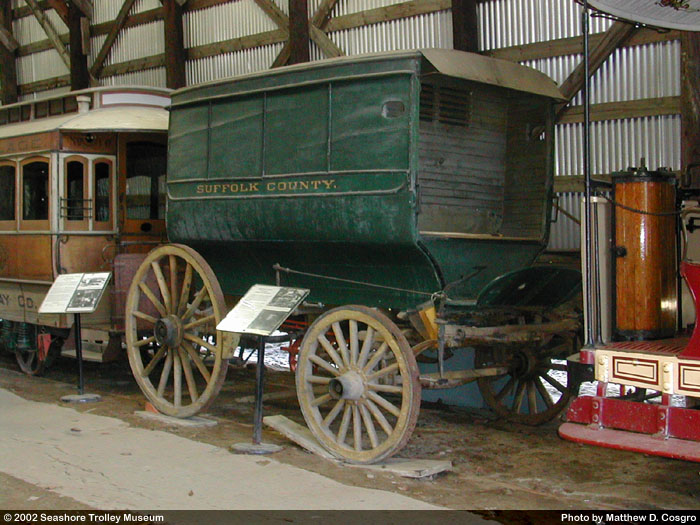
Matthew D. Cosgro in 2002
- Description
- Sheriff's wagon for prisoner transport
- Type
- Other
- Acquired by the Museum
- 1983
- Note
- The sheriff’s wagon is on display in the Highwood Exhibit Barn.
Suffolk County Sherriff Wagon
From Boston, Massachusetts
History
The first urban mass transit vehicle was the omnibus – a horse-drawn road vehicle somewhat like a stagecoach. The first omnibus operation is believed to have been in Paris, France in 1819. Stagecoaches had doors on each side, carried six or eight passengers and usually did not pick up and drop off passengers en-route. An omnibus was larger and could carry about twelve passengers. Passengers boarded the omnibus through a door at the rear and sat on benches along each side. The driver’s seat was usually high outside the front and equipped with a hand brake. Baggage or additional passengers might be carried on top. Omnibuses boarded passengers at stops along a route. In the winter, wheels might be replaced with runners to create a sleigh.
Omnibuses began running in New York City and Boston in the late 1820s and early 1830s. (Sources differ on the earliest dates.) By 1850, New York City had 500 omnibuses operated by 3,000 workers and 5,000 horses. In 1853, Boston had 30 omnibus routes. Omnibuses were succeeded by horsecars which were horse-drawn vehicles with flanged wheels on steel rails. Horsecars could carry 24 passengers and provide a much smoother ride than an omnibus. Boston’s first horsecar line was the Cambridge Railroad in 1856. By 1873, Boston was down to just two omnibus routes.
The early history of Seashore’s sheriff’s wagon is not documented. It is believed to have been built as early as the 1850s. It was pulled by two horses. Compared with many omnibuses, the driver’s seat on the sheriff’s wagon is lower and has an overhead covering. The wagon may have started life as a regular omnibus. Around the time that Seashore acquired the wagon in the 1980s, Seashore members Frank Cheney and Jeffrey Sisson heard stories from a long time city employee who thought that the sheriff’s wagon had been converted from a regular omnibus since the city of Boston had acquired a number of used omnibuses. The sheriff’s wagon is of the type used in Boston in the late 1800’s by the Hathorne Line and the Hobbs Omnibus Company who later sold their vehicles to the Metropolitan Horse Railroad and the West End Street Railway who used them on special routes and for charter service. The Boston Elevated Railway acquired the West End Street Railway in 1897 and used some former omnibuses in work service. At some point Seashore’s sheriff’s wagon was acquired by the Suffolk County Sheriff’s Department and was used to carry prisoners from jail to court. (Suffolk County includes Boston and some nearby towns.) It appears that windows have been boarded up. About 1945, the wagon, along with a similar vehicle with sleigh runners, was moved to the city Public Works Building at 650 Albany Street in Boston. In 1977, there was a plan to move the wagon and sleigh to the Larz Anderson Auto Museum in Brookline, but that museum lacked space.
After the Larz Anderson plan failed, the city of Boston loaned the sheriff’s wagon and sleigh to the Museum of Transportation at Museum Wharf in Boston. When this museum closed in 1982, the wagon went into the Museum of Transportation’s warehouse in Cambridge. The wagon came to Seashore in 1983 along with the similar sleigh. In 1987, the U.S. Marshal’s service asked Seashore for a loan of the sheriff’s wagon to be used in a Smithsonian traveling exhibit to mark the 200th anniversary of the Marshal’s Service to be in 1989. To prepare for this exhibit, Seashore’s shop rebuilt a side panel, driver’s foot board and the rotted underframe. However, the Marshal’s Service eventually decided not to use the wagon.
Technical Information
- Seats: 12
- Tires: wagon wheels
Weight and Dimensions
- Length: 12’
- Width: 8’ 4.00"
- Height: 8’ 8.00"
© 1998 - 2026 New England Electric Railway Historical Society. All Rights Reserved.